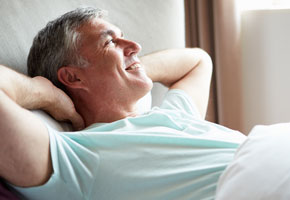
10 Tips for Better Sleep
By Karen Shepard | 0 Comments | Posted 08/31/2014
If you are interested in improving the quality of your sleep and do not suffer from a serious sleeping disorder, there are several things you can do to help you get the rest you need. Here are 10 tips for better sleep.
- Exercise. Oh there’s a surprise right? But it’s true. Exercise is the cornerstone of any healthy lifestyle and impacts sleep as much as any other aspect of your daily physical life. I always thought working out late was a no-no, but the majority of studies seem to conclude that exercise helps with sleep whether it’s an early stretch or late run. Regular physical activity allows for better rest.
- Curb Caffeine. If you are a coffee drinker or consume other caffeinated beverages, stop sipping at least six hours before bedtime.
- Limit light. Your body responds to light so if you have trouble falling asleep, start turning off or dimming lights early in the evening to begin sending your brain the message that its time to rest.
- Make your bedroom a restful place. There are only two activities that should go on in the bedroom, and that’s only because it’s easier to sleep after one of them.
- Eliminate technology. TVs, computers and even alarm clocks, (especially if they have blue lighted numerals) don’t belong in the bedroom. You can’t sleep while you are watching, working, browsing or tweeting. Harvard Health Publications says: “Light at night is bad for your health, and exposure to blue light emitted by electronics and energy-efficient light bulbs may be especially so.”
- Have a snack. If you would like a reason to indulge in carbs, here you go. Small amounts of foods like honey and yogurt, bananas, eggs, seeds, bread and cheese, or cereal and milk, will increase the level of tryptophan in your bloodstream helping you to feel drowsy. But be sure and keep portions small. A full stomach can delay sleep rather than help promote it. Finish any heavy meal at least four hours before bedtime.
- Don’t be alarmed by Alarms. Alarm clocks are important, but if you’re a clock-watcher, put yours out of sight. The habit of waking up and watching to see how many hours you have left to sleep, sets up a cycle of tension that robs you of even more much needed rest. If possible set the tone for something less than jolting and allow your self to wake gently to the sound rather than be rocketed out of bed.
- Avoid alcohol. That glass of wine may make you drowsy, but you will have a tendency to wake more often, have less restful sleep, and even nightmares. Other side effects can be night sweats, and headaches. Last drink should be with a meal at least four hours before bedtime.
- Sorry, No Smoking. Smoking may simulate a relaxing reprieve from the day, but nicotine is a stimulant and will not help you rest. If you smoke, make a point to take your last drag early rather than late.
- Over the Counter, Counter. Its true that Antihistamines and other over the counter meds can help you feel drowsy, but many are habit forming and don’t solve the actual problem.
If you have ongoing or serious sleeping problems, you should contact your Physician for treatment and review.
Resources
Ask the expert how does exercise help those with chronic insomnia?
Healthy – expert answers on sleep aids.
Our Wild Oats bloggers are partners who love to share their passion and
knowledge about better living! While we compensate them for being a part
of this vibrant community, their views and opinions are their own and do
not signify Wild Oats' opinions, endorsement or recommendations. Wild Oats
reserves the right to moderate and remove comments that are off-topic or
inappropriate, so please help us keep this community clean, fun and
valuable!


 Contact us
Contact us



























